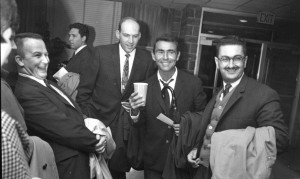John Keshishoglou, founding dean of the Ithaca College School of Communications passed away last Wednesday from pancreatic cancer. He was 79. His impact and memory linger not only at the college, but also worldwide.

Keshishoglou was born in northern Greece, worked as a photojournalist for the Greek and foreign press, and served in the Greek Army for two years. After an honorable discharge, he went to the United States to further his education. There he received a B.A. from Morningside College, an M.A. from the University of Iowa and a Ph.D. in mass media and instructional design from Syracuse University.
Known as “Dr. Kesh,” he joined the college community in 1965 as chair of the Department of Television-Radio and director of the Instructional Resources Center. In 1971, after the creation of the communications school, he became dean and held the position until 1979.
Diane Gayeski, current dean of the communications school, was a student while Keshishoglou was dean and said he brought incredible vision and energy to the college community.
“There wouldn’t be a school of communications without him,” she said. “He was willing to battle administration and personally put his own reputation on the line to promote what he really knew could be the school of communications.”
In 1967, Keshishoglou brought Rod Serling to the college as a visiting professor. The “Twilight Zone” creator taught until his death in 1975. Keshishoglou was a founding member of the committee that organizes the biennial Rod Serling Conference.
Melissa Gattine, manager of the Office of Marketing Communications and Park Design House, worked with Keshishoglou on the Rod Serling Conference committee since the conference’s inception in 2006 and said he will be missed at the upcoming conference next week.
“Kesh was known to have this really spunky style,” she said. “People really admired him for his personality and also his professional contributions. He was kind of our institution. He was really symbolic of the communications school.”
Gayeski said Keshishoglou was always concerned with his students and incredibly hands-on. She remembered an instance when she was working on an ICTV production and someone was short a camera operator on their crew.
“They were in a little bit of a panic, and they were sort of running around and Dr. Kesh said, ‘What’s going on?’ and they said, ‘My cameraman didn’t show up,’” she said. “And he said, ‘No problem I’ll fill in,’ and just went in and ran camera for the show.”
Patricia Zimmermann, professor of cinema, photography and media arts, knew Keshishoglou as a colleague and friend for more than 30 years. She worked with him both at the college and at Nanyang Technological University in Singapore.
“This is really someone who brought the world to the communications school and brought the communications school to the world,” she said.
Zimmermann said Dr. Kesh’s impact on students was enormous wherever he taught. After his students in Singapore heard of his death, they went to Facebook and began creating a memorial for him.
“Sometimes students and those of us at Ithaca College can forget that there are people on our faculty who push us irrevocably into the world beyond Ithaca,” she said. “That is truly what Kesh taught me about the life of an intellectual. It’s not about being in just one little place, in one little, tiny community. It’s about this larger social, intellectual and ethical contract with the world.”
Even after retiring in 2000, Keshishoglou remained active in the Park School by working with Park Scholars and teaching courses until last year.
Last spring, the communications school established the John Keshishoglou Center for Global Communications Innovation to honor his passion for international media. The center houses an annual mini-course and international media competition, Media for Social Responsibility, which helps defray student and faculty travel costs for international research. Eventually the center will house a global executive master’s degree in communications innovation.
“It very much honors Kesh’s spirit of globalization and innovation,” Gayeski said.
The John Keshishoglou Center embodies his spirit of global communication. Zimmermann said he would encourage every student to travel.
“Many times he told me the most important part of our communications student education is to live overseas and travel overseas.”
Keshishoglou was a driving force for what the communications school has become, and Gayeski said he never gave up his commitment to the college.
“We certainly want to honor his legacy,” Gayeski said. “He was the first dean. I was his student, and here I am the current dean. I feel very humbled to follow in his footsteps.”
A funeral service is planned for 11 a.m. Saturday at St. Catherine’s Greek Orthodox Church at 120 West Seneca St.







